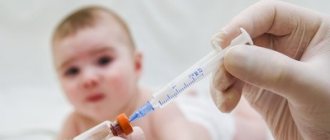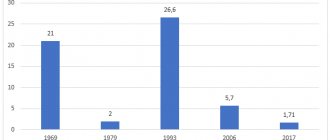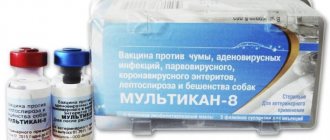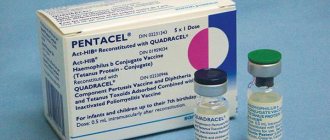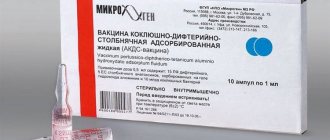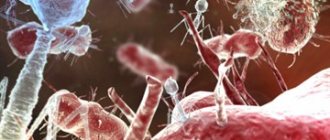What is the DPT vaccine for?
DTP vaccination is an adsorbed pertussis-diphtheria-tetanus vaccine. All three diseases that it protects against are caused by bacteria that produce toxins and attack the human body. Vaccination cannot protect against bacterial infection - it is aimed at neutralizing toxins.
Vaccine composition
The DPT vaccine contains components of three bacteria: Bordetella pertussis (causes whooping cough), Corynebacterium diphtheriae and Clostridium tetani (causes diphtheria and tetanus, respectively).
The pertussis component of the vaccine is represented by whole microbial cells, previously “killed” by formaldehyde. To protect against diphtheria and tetanus, the vaccine includes separate purified diphtheria and tetanus toxoids, which are obtained from the bacteria that cause these diseases. Thus, DTP is an inactivated vaccine. It may not provide as much protection as live, attenuated vaccines such as the measles vaccine, so it must be given multiple times.
Aluminum salts are added to DPT as an immune response enhancer (adjuvant). Antigens adsorbed on them provoke the development of humoral immunity.
Many people are afraid of the DPT vaccine because of its high reactogenicity. This is due to its pertussis component – whole cells of Bordetella pertussis. If for some reason your child cannot receive DPT, vaccination against diphtheria and tetanus can still be done. For this purpose, there are separate preparations of toxoids: AS - tetanus toxoid, AD - diphtheria toxoid and ADS - diphtheria and tetanus toxoids without pertussis component. Of course, ADS vaccination is more convenient, because then you will have to give fewer injections when receiving subsequent doses.
Goals of revaccination
In order for the body to develop lasting immunity against dangerous diseases, it is necessary to carry out several treatment and preventive procedures. People react differently to the same vaccine. There are cases when the body itself forms immunity for five to ten years. In most situations, one DPT vaccination does not give a good result, for this reason repeated vaccination is required. The immunity provided by the vaccine is long-lasting, but not lifelong.
Thanks to DPT revaccination, the body strengthens the formed antibodies against serious diseases. Immunization is more than just vaccination. The term refers to a number of measures aimed at maintaining the body's defenses. If a patient misses a revaccination, the likelihood of contracting the disease increases several times. Tetanus, diphtheria and whooping cough pose a threat to the lives of elderly patients, since their immunity is weakened.
Popular Sweets and other foods that should not be eaten during mantu
Vaccination schedule
DTP vaccination is included in the National Preventive Vaccination Calendar. The vaccination course consists of three vaccinations:
- at 3 months,
- at 4.5 months,
- at 6 months.
Then at 18 months, revaccination is carried out. If the schedule was violated, the doctor waits 12–13 months after the last DPT vaccination. If the DPT vaccine was not administered at all, the age of the child matters:
- if the child is under 3 years 11 months 29 days, DPT is administered;
- if older, but not yet 6 years old, the pertussis component is excluded and ADS toxoid is administered;
- for children over 6 years of age, ADS-M toxoid is used, in which the content of diphtheria toxoid is reduced.
Important! According to the vaccination schedule, children at 6-7 and 14 years of age must undergo a second and third revaccination against diphtheria and tetanus using toxoid preparations with a reduced content of the diphtheria component (ADS-M). In the future, revaccination against these diseases is carried out for all adults once every 10 years.
Revaccination of older children and adults against whooping cough is not carried out in Russia, although vaccination with acellular whooping cough vaccines is widely practiced abroad in children and adolescents, as well as pregnant women, starting from the 26th week of pregnancy, which helps protect infants under 3 months from the disease (for vaccination of older children age and adults use special preparations with a reduced content of diphtheria toxoid).
How do you feel about mandatory vaccination?
- Positively, it prevents many diseases. 60%, 2648 votes
2648 votes 60%2648 votes - 60% of all votes
- Negatively, these are all government schemes to make it easier to manage us. 26%, 1164 votes
1164 votes 26%
1164 votes - 26% of all votes
- Neutral, I don’t think it has any effect on my health. 13%, 594 votes
594 votes 13%
594 votes - 13% of all votes
Total votes: 4406
Votes: 4381
January 17, 2018
×
You or from your IP have already voted.
Preparing a child for vaccination
Before vaccination, children are always examined by a pediatrician.
Photo: AllaSerebrina / Depositphotos The vaccine is administered intramuscularly; the procedure does not require any special preparation. However, DPT has contraindications. Some are worth paying attention to, others only create false impressions about the vaccine.
True contraindications include:
- allergy to vaccine components, which manifests itself in a strong general reaction or complications after the previous administration. These include: the first two days, temperature above 40 ℃, swelling more than 8 cm in diameter, developed Guillain-Barré syndrome (autoimmune disease);
- severe immunodeficiency;
- convulsions/fits and other diseases of the nervous system in a progressive process.
What conditions cannot be exempt from vaccination?
False contraindications to DTP vaccination:
- acute diseases (4 weeks after recovery), mild respiratory diseases (2 weeks after);
- chronic diseases (the main thing is to wait for remission);
- diathesis (beyond exacerbation);
- weight loss, prematurity;
- allergic diseases: local rashes, spasm of the respiratory tract with cough (bronchospasm);
- taking antibiotics;
- convulsions/allergic reactions to DTP in relatives.
Why do they vaccinate in the leg?
Many parents are skeptical about administering vaccines to their child's lower extremities. However, today this is normal practice, which allows you to achieve maximum results from vaccination.
An injection in the thigh area is given for two reasons:
- There is a fairly large fat layer in the buttocks. As a result, after administration, the drug takes much longer to be absorbed, which leads to a loss of vaccine effectiveness and negatively affects the process of developing immunity.
- There is a high risk of injuring the baby’s sciatic nerve, which can lead to the development of serious neurological pathologies.
To protect the baby and increase the effectiveness of vaccination, doctors recommend injecting the vaccine into the thigh. For children this is the best option.
DTP analogues
Due to the frequency and severity of side effects associated with DTP, new, acellular drugs (ACDs) became widespread in the mid-1990s. All of them, like DPT, are combined with diphtheria and tetanus toxoids, but instead of whole pertussis bacteria they contain only individual pertussis antigens. Such vaccines are better tolerated and have completely replaced the DPT vaccine in many countries with a low risk of whooping cough infection. Many of the new cell-free drugs protect against 5 or even 6 infections at once:
- Infanrix hexa (6 infections, including hepatitis B, polio and Haemophilus influenzae),
- Pentaxim (5 infections, including polio and hemophilus influenzae),
- Tetraxim (4 infections, including polio).
Among the three-component BCVs: Infanrix for children and Adasel for adults (this vaccine has a reduced amount of diphtheria toxoid).
However, experts believe that the whole-cell vaccine protects better - there are more antigens, and the immune response is closer to natural infection. If we compare acellular vaccines, those with more pertussis antigens protect better.
When choosing between whole-cell drugs, in addition to DPT, you can pay attention to four-component ones, which also protect against hepatitis B.
Risk of post-vaccination complications
Possible specific complications of DTP vaccines include neurological complications, which are extremely rare. It is believed that they may be caused by the fact that the toxins (even inactivated) of pertussis bacillus in combination vaccines tend to irritate the meninges of a very small proportion of susceptible children. Complications in the form of encephalopathy are less than 1 case per 300 thousand vaccinated people.
Currently, in the world, convulsions without fever are not considered a complication of vaccination. Research conducted in Great Britain in 1960-1970. indicate the same frequency of seizures in both vaccinated and unvaccinated children. Moreover, the first manifestations of diseases such as epilepsy and organic brain damage can appear at the age of 3-4 months in the form of seizures, when vaccination is carried out, and are associated with vaccination only by a temporary factor.
The development of afebrile seizures indicates the presence of an organic lesion of the nervous system in the child, which was not taken into account and identified or could not be identified before vaccination for objective reasons. Therefore, in the event of afebrile seizures, a comprehensive neurological examination is necessary to make a diagnosis.
Which vaccine is better to choose?
Both domestic and foreign vaccine preparations against whooping cough are presented on the Russian market.
Photo: TTK TV channel In Russia, people are vaccinated with whole-cell DPT produced by the Federal State Unitary Enterprise NPO Microgen of the Russian Ministry of Health. Foreign acellular vaccines are also available:
- Belgian "Infanrix"
- French "Tetraxim" from SANOFI PASTEUR,
- French "Pentaxim" from SANOFI PASTEUR.
The Russian inactivated combined vaccine “Bubo-Kok” produced by CJSC NPK “Combiotech” also protects against hepatitis B. The first Russian 5-valent vaccine “aDTaP-HepB+Hib” or pentovaccine produced by FSUE “NPO Microgen” is already available. It protects against five common childhood infections: diphtheria, whooping cough, tetanus, hepatitis B and Haemophilus influenzae.
Pertussis vaccine for adults
Until recently, there were no pertussis vaccines for adults in Russia.
However, in 2021, the drug “Adasel” produced by SANOFI PASTEUR appeared on the domestic market (Fig. 1). This is an acellular vaccine with a reduced content of diphtheria component. The US Centers for Disease Control and Prevention (CDC) recommends giving Adasel to adults as a booster dose to re-prime the body's immune response. The drug can also be administered to children, but again for revaccination, and not as a first dose. Pregnancy is not a contraindication for vaccination. The CDC offers pregnant women the same acellular Adasel. It is introduced at the beginning of the third trimester. In Russia, such vaccination is not practiced, although studies indicate there is no evidence of a risk to pregnancy. In America, this drug is administered before each pregnancy, even if there is a year or two between them. Children in the first months of life are susceptible to whooping cough; if the mother has not been vaccinated, they are defenseless against infection.
Figure 1. Adasel vaccine. Source: NSW Health
What to do after vaccination
It is important to monitor the condition of the body after vaccination. Their parents do this for their children. Mild side effects are more likely a good sign that the body has begun to work on its immune response. It is necessary to spend at least half an hour near the vaccination room in case of unexpected severe reactions.
The main thing is not to panic when normal passing reactions appear. You can ask your doctor in advance about antipyretic and antihistamine medications for children. On the 3rd day after vaccination, the appearance of any reactions is uncharacteristic.
What to do if the redness grows and thickens?
It is best to consult a doctor. Only he will professionally assess the severity of the situation and give the necessary recommendations. Doctors warn parents that they should not handle post-vaccination reactions on their own.
Any ointments or compresses (without consultation with the pediatrician) can aggravate the situation. If the redness continues to increase, and the injection site becomes more and more dense and painful, it means that the vaccination was carried out incorrectly.
Most likely, the wound got infected. This is dangerous due to the development of an abscess (accumulation of pus in the infiltrate). But the reason may also be individual intolerance to the composition of the vaccine. To prevent this from happening, the baby must be thoroughly examined before immunization and be absolutely healthy at the time of vaccination.
What are the signs of an abscess? They are as follows:
- tissue softening is felt in the compaction;
- in the center of the abscess the skin becomes thinner. Therefore, an abscess can open on its own if it is located superficially;
- the skin in the affected area is bright red and hot;
- body temperature from 39 and above;
- throbbing pain at the site of swelling.
Such compaction will not go away on its own. He needs to be operated on, which means contacting a surgeon. If the doctor only suspects the presence of an abscess, the baby is given an ultrasound. The danger of a post-vaccination abscess is that it can break out on its own at any time.
Then the pus will enter the closed cavities and spread the infection throughout the body. After surgery, the baby is prescribed antibacterial drugs.
To prevent such situations from happening, parents should prepare for vaccination. You should find out in advance the quality of the drug offered by the clinic.
And if in doubt, purchase the vaccine yourself. It is equally important to prepare your baby for vaccination.
The day before (two days before the procedure) and after it, protect your child from negative psycho-emotional moments. It is very important that the child does not get sick on the day of vaccination, this will weaken his immunity, and vaccination may be difficult.
Be sure to make sure that the baby has no contraindications to the administered drug. If the preparation is carried out correctly and the injection is done correctly, there is nothing to fear.
What not to do after DTP vaccination
It is better not to engage in physical activity, because an enemy has entered the body, albeit inactivated. The body’s task is to develop cells that will resist this enemy. Therefore, in the first few days you should ensure yourself peace. However, if the child feels well, then walking is not contraindicated.
It is also not recommended to change the diet of a child or a nursing mother. This can lead to additional stress on the intestines, and therefore on the entire body.
Video on the topic
A practicing allergist-immunologist on what to do if a child limps after a leg vaccination:
The DTP vaccine is considered quite difficult for a child’s body, and the vaccination period is a big burden on the baby himself and his loved ones. It is accompanied by worries, anxiety, visits to doctors and pharmacies. But this vaccine is one of the most necessary; it allows you to create reliable immunity against dangerous diseases.
And in order to get rid of doubts and unnecessary worries about the use of DTP, you need to consult with your doctor in advance on how to properly prepare the child and prepare yourself for this procedure.
Complications after vaccine administration
DTP vaccination can cause prolonged crying in children.
Photo by Laura Garcia: Pexels Complications after vaccination that require seeking medical attention include:
- allergic rash (not local),
- more than 3 hours of uncontrollable screaming and crying,
- swelling of the face and throat,
- labored breathing,
- cardiopalmus,
- dizziness, nausea and weakness.
In the 1970s, the use of whole-cell DTP vaccine was associated with encephalopathy in children. However, numerous studies have proven the absence of this connection.
Post-vaccination reactions
If vaccinations are carried out with DTP vaccines, then it should be remembered that these vaccines are the most reactogenic, “heavy” vaccine preparations. On average, adverse events occur in a third of vaccinated people. They are manifested by a moderate increase in body temperature and mild malaise within 24 hours after vaccination. As a rule, all post-vaccination reactions to DTP vaccines develop no later than 72 hours after vaccination and last no more than 48 hours. Acellular vaccines are considered less reactogenic. The most characteristic features of acellular vaccines are the low incidence of temperature reactions, local reactions at the injection site and, most importantly, the incidence of post-vaccination complications.
